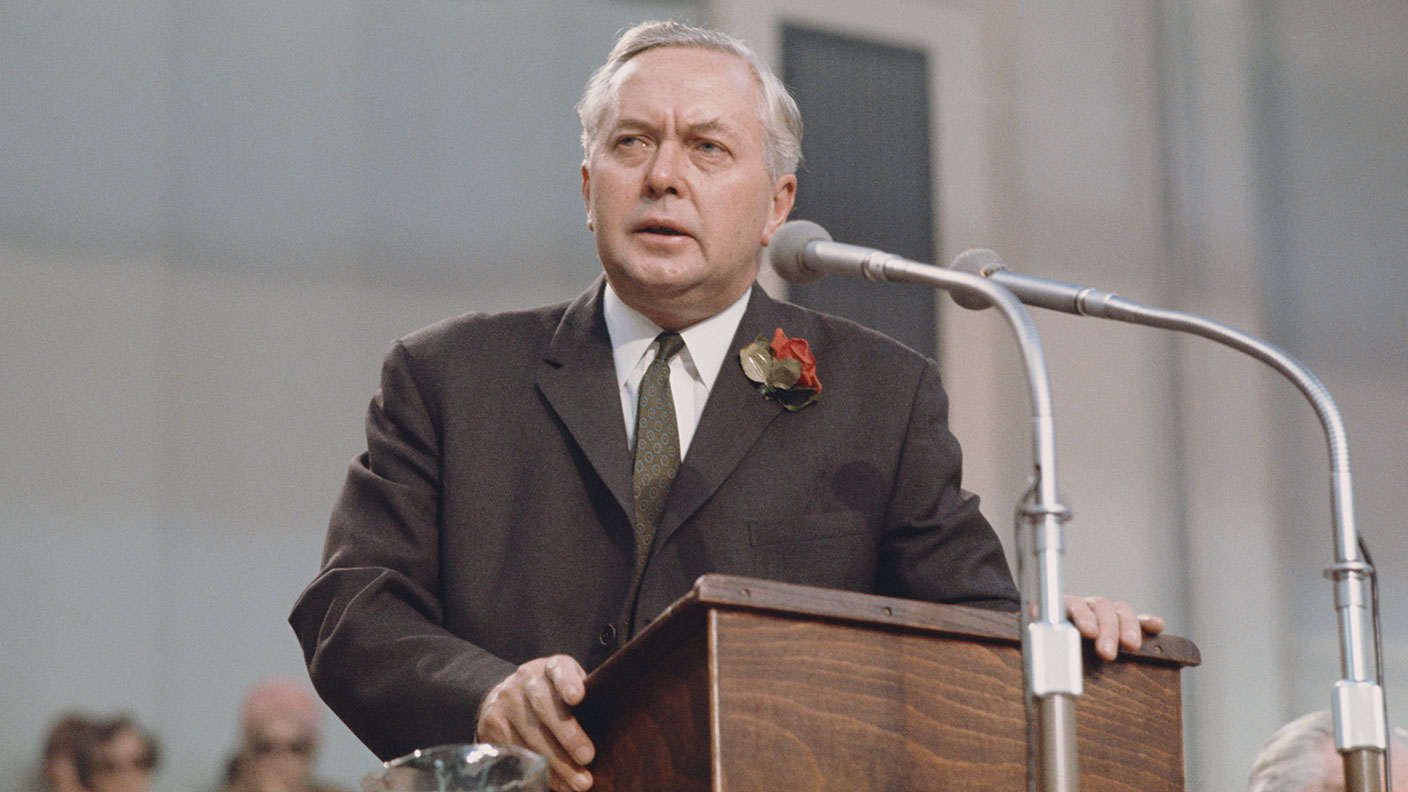19 November 1967: Harold Wilson’s ‘pound in your pocket’ little white lie
On this day in 1967, Harold Wilson went on television to reassure viewers that the “pound in the pocket” would be unaffected by the devaluation of sterling.


Get the latest financial news, insights and expert analysis from our award-winning MoneyWeek team, to help you understand what really matters when it comes to your finances.
You are now subscribed
Your newsletter sign-up was successful
Want to add more newsletters?
In 1967, Britain suffered a balance of payments crisis, spending (importing) more than it was earning (exporting). That made it crucial to keep the pound strong. The hitch was that supporting the pound was fast becoming unaffordable: the Bank of England burned through £200m in gold and foreign currency reserves in just one day alone. And so in November, sterling was devalued by14.3% against the dollar.
It was a personal defeat for Prime Minister Harold Wilson. But on 19 November, he went on radio and television to reassure consumers that devaluation "does not mean, of course, that the pound here in Britain, in your pocket or purse, or in your bank, has been devalued". It didn't take an economist, however, to tell you that that was nonsense.
"That broadcast will long be remembered for that sentence", crowed Conservative MP and future prime minister Ted Heath in Parliament. "It will be remembered as the most dishonest statement ever made." Wilson had fibbed. The pound in your pocket is, of course, the same pound that is used to import food and other things from abroad. Prices were going to have to rise.
Try 6 free issues of MoneyWeek today
Get unparalleled financial insight, analysis and expert opinion you can profit from.

Sign up to Money Morning
Don't miss the latest investment and personal finances news, market analysis, plus money-saving tips with our free twice-daily newsletter
Don't miss the latest investment and personal finances news, market analysis, plus money-saving tips with our free twice-daily newsletter
But while it was hoped that British farming and manufacturing would get a boost, not everything could be made or grown here. "Devaluation means moving resources from consumption to the balance of payments", wrote The Times. "It means an initial reduction in this country's living standards."
So, who was to blame for Britain's distress? "Candidates abound", said The Times' economic editor, Peter Jay. "Was it the fault of the gnomes, the moaning minnies, the selling-Britain-short brigade'? Or was it the wild-cat strikers, the tightly knit groups of politically motivated wreckers?" Perhaps the culprits were to be found abroad
Get the latest financial news, insights and expert analysis from our award-winning MoneyWeek team, to help you understand what really matters when it comes to your finances.

-
 Financial education: how to teach children about money
Financial education: how to teach children about moneyFinancial education was added to the national curriculum more than a decade ago, but it doesn’t seem to have done much good. It’s time to take back control
-
 Investing in Taiwan: profit from the rise of Asia’s Silicon Valley
Investing in Taiwan: profit from the rise of Asia’s Silicon ValleyTaiwan has become a technology manufacturing powerhouse. Smart investors should buy in now, says Matthew Partridge
-
 31 August 1957: the Federation of Malaya declares independence from the UK
31 August 1957: the Federation of Malaya declares independence from the UKFeatures On this day in 1957, after ten years of preparation, the Federation of Malaya became an independent nation.
-
 13 April 1960: the first satellite navigation system is launched
13 April 1960: the first satellite navigation system is launchedFeatures On this day in 1960, Nasa sent the Transit 1B satellite into orbit to provide positioning for the US Navy’s fleet of Polaris ballistic missile submarines.
-
 9 April 1838: National Gallery opens in Trafalgar Square
9 April 1838: National Gallery opens in Trafalgar SquareFeatures On this day in 1838, William Wilkins’ new National Gallery building in Trafalgar Square opened to the public.
-
3 March 1962: British Antarctic Territory is created
Features On this day in 1962, Britain formed the British Antarctic Territory administered from the Falkland Islands.
-
10 March 2000: the dotcom bubble peaks
Features Tech mania fanned by the dawning of the internet age inflated the dotcom bubble to maximum extent, on this day in 2000.
-
9 March 1776: Adam Smith publishes 'The Wealth of Nations'
Features On this day in 1776, Adam Smith, the “father of modern economics”, published his hugely influential book The Wealth of Nations.
-
 8 March 1817: the New York Stock Exchange is formed
8 March 1817: the New York Stock Exchange is formedFeatures On this day in 1817, a group of brokers moved out of a New York coffee house to form what would become the biggest stock exchange in the world.
-
7 March 1969: Queen Elizabeth II officially opens the Victoria Line
Features On this day in 1969, Queen Elizabeth II took only her second trip on the tube to officially open the underground’s newest line – the Victoria Line.